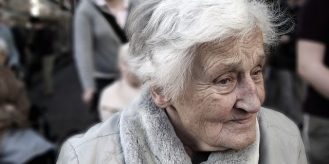With the challenges of caring for an aging population at the top of today’s social agenda everywhere (see the article from Myers-JDC-Brookdale’s Research in Action, Issue #1), MJB has developed a shared learning process with Jewish Care, the United Kingdom’s largest Jewish social service organization.
The February exchange focused on two critical issues that are becoming more and more acute: care of elderly people living with dementia and care at the end of life. In the intensive discussions with Jewish Care and other partner organizations, and in site visits and discussions with field staff and clients, the group gained a new international perspective on how to better address some of the most challenging issues facing care for the elderly today.
A Person-Centered Approach
The Israeli visit to England came at a seminal time, as Jewish Care is in the midst of a process of significant and exciting reorientation of its basic approach to care.
The focus today in Jewish Care is on how to design and implement all of its services, from institutional care to community care, in a way that places the person and their unique needs at the center.
“Instead of talking about services, we talk about people,” explained Simon Morris, the organization’s director. “Our approach is to emphasize what they can do, not what they can’t do.” The “person-centered” approach focuses on delivering services in a way that addresses the unique history of the person being cared for, and that provides them with meaningful choices and control within the services offered. It is about promoting dignity, well-being, and meaningful lives.
Examples of the person-centered approach include:
-
A state-of-the-art technique called Dementia Care Mapping, used to observe clients in detail for an entire day to learn about their day and how to try to improve it.
-
The Eden Alternative, in which residential environments are made as lively as possible, using colors, plants, and animals.
-
Memory display boxes outside each person’s room in an assistive living setting, with pictures and ornaments that are meaningful to them.
-
“Open” kitchens to give residents an added level of independence by preparing drinks or snacks as they wish, rather than having to rely on the institution’s dining schedules.

Shirli Resnizky, a researcher in MJB’s Center for Research on Aging, found these examples to be one of the most impressive parts of the visit. “The way in which they implement respect for the independence of the elderly, and take into consideration their wishes, especially in the care for elderly with dementia, is something that we can bring back to Israel and apply.”
Another innovative program the group saw was Music for Life, in which professional musicians use improvisation to draw out the potential for self-expression and communication among people with dementia. Different from traditional music therapy, the musicians and the residents create a unique piece of music together, which in turn helps to draw out those who are emotionally cut off and disempowered because of the advanced stage of their condition.
End-of-life care was another area where study trip participants saw the person-centered approach in action. Because families and staff are often resistant to discussing end-of-life planning, Jewish Care uses a system in its nursing care homes whereby families and staff discuss preferences and wishes for end-of-life treatment at the time of admission, and draw up a customized end-of-life care plan for each resident. In these discussions, the concern for quality of life dominates, with a primary interest in ensuring that clinical decisions are made with the best interest of the person in mind.
Jewish Care uses an extensive training system for everyone involved in its care system—staff, volunteers, and relatives—to reinforce the person-centered perspective. They invest much time in training staff and caregivers to understand the needs and backgrounds of the people they are caring for, such as explaining to a caregiver from the Philippines why an elderly Holocaust survivor might be resistant to being taken to a shower—and how the caregiver should respond. The training emphasizes that care is more than just providing for a person’s needs—it’s about building a relationship with the person.
Opportunities to Reflect
“More than anything, it was inspiring to see how they are translating these principles into action. They are trying to implement a set of principles that people often talk about but rarely implement with the creativity, hard work, and focus necessary to succeed,” reflected Jenny Brodsky, Director of MJB’s Center for Research on Aging, after returning to Israel.
For Jennifer Shuldiner, a researcher in the Center for Research on Aging, the exchange “stimulated significant discussions among the Israeli group itself and sharpened our understanding of our own system.”
Today, the professional exchange with Jewish Care is continuing. One challenge to implementing person-centered care is the lack of a system to measure and monitor success. MJB and Jewish Care have agreed to cooperate on developing a set of outcome measurements to assess Jewish Care’s progress, which will be of wider interest in Israel and elsewhere. In addition, efforts are underway to document and share similar efforts on outcome measurement in Israel.
The professional exchange with Jewish Care has been brought about through the efforts of Martin Paisner, Chairman of the MJB Board.



